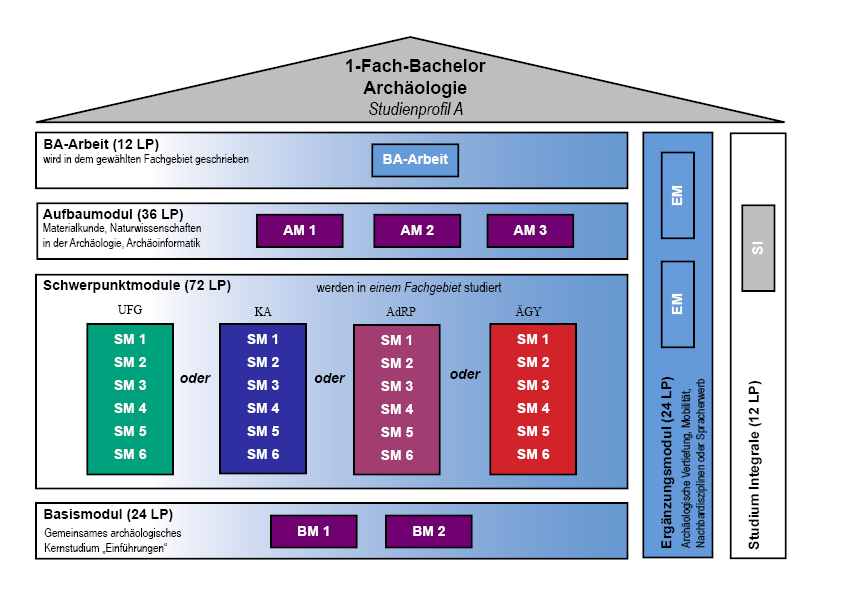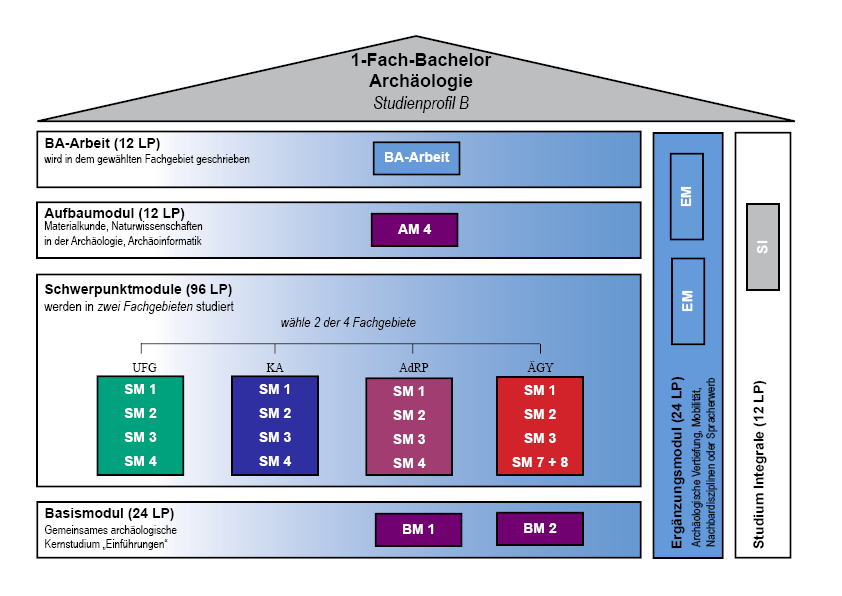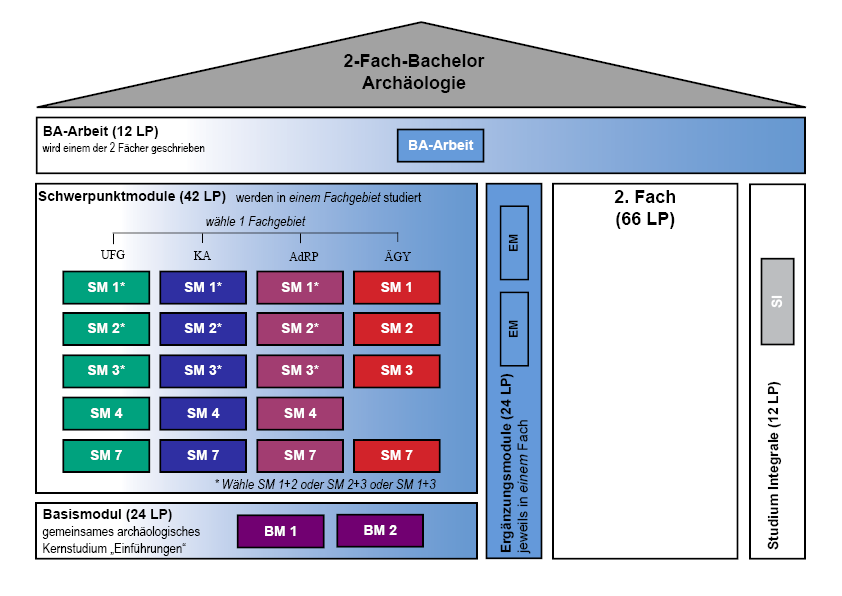Bachelor's degree program 'Archäologie' (German)
In Cologne four archaeologies can be studied in the course of the Bachelor program in different possibilities of combination of Classical Archaeology, Archaeology of the Roman Provinces, Prehistoric Archaeology and Egyptology: In a single major study, one can choose one or two of the archaeological specializations (Study profile A), or two specializations of choice (Study profile B). In addition, in a double major one of the four available specializations can be combined with an external discipline.
Structure
The degree programs require the completion of 180 credit points (LP) each. In both the single-subject and the double-subject programs, a common core study is obligatory, consisting of 2 basic modules, each with 3 introductions to the various disciplines and their methods, as well as the associated tutorials (24 LP).
This is followed by the actual subject studies, in which students can choose between the study profiles A and B: In the single-subject program with only one archaeology (study profile A), a total of 72 LP is earned; if two archaeologies are chosen (study profile B), 48 LP each. An integral and innovative component of both variants of the single-subject program is a block of natural sciences / geoarchaeology / archaeoinformatics, which is stronger in study profile A (36 LP) than in study profile B (12 LP). In the supplementary area, specializations of free choice take place according to the students' interests (24 LP) as well as the Studium Integrale (12 LP). The subject grade results from the focus modules taken during the course of study and the Bachelor thesis (12 LP), which is usually completed in the 6th semester.
In the two-subject Bachelor, one archaeological discipline can be freely combined with an external subject at the University of Cologne. Here too, however, the joint core study (24 LP) of the three Cologne archaeological subjects is obligatory. In the advanced specialized studies, 42 LP are provided on top of this. The supplementary area provides for in-depth studies of the students' choice (24 LP) and the Studium Integrale (12 LP).
Examination requirements
Modules are usually concluded with a module examination based on the learning objectives and learning outcomes defined for the module. Module examinations can be taken in written, oral, practical or combined form.
An overview of the form and duration of the respective examination performance according to the examination regulations 2015 (7th/8th ÄO) can be found under "Further information on the study program". Regardless of the format, you must register independently for each module examination within the deadlines via Klips2.0. Without registration, there is no entitlement to participation or assessment of the examination performance. Homeworks and written elaborations (also protocols and essays) must be accompanied by the completed "Formal cover sheet for term papers" (see 'Term Paper').
According to the examination regulations for the BA/MA program at the Faculty of Philosophy of the UzK, the following formats are intended as module examinations for the BA/MA Archaeology program:
- Combined MP
- Written MP
- Oral MP
Characteristics of the combined examination form are usually:- Presentations with written elaboration or paper with lecture. Combined examinations may only comprise examination performances that are suitable for checking the acquisition of different (partial) competences. They will be evaluated as a whole. At the Archaeological Institute, the written paper must be accompanied by the "Formal Cover Sheet for Term Papers", which contains a declaration of the independent composition of the written paper.
Expressions of the written examination form are usually:
- Written examination: A written examination is a piece of work to be completed under supervision, in which given tasks are to be worked on alone and independently using only the approved aids. The duration of a written exam is usually at least 45 and at most 180 minutes. Examinations may also be conducted in electronic form or in the form of an answer-choice procedure in accordance with § 13.
- Term paper: A term paper is an independent written elaboration of a given topic that has been dealt with in the context of the relevant module. It must be submitted in written form and as a file on a readable data carrier in a format specified by the examiner. The term paper must be accompanied by the "Formal Cover Sheet for Term Papers" at the Archaeological Institute, which contains a statement on the independent composition of the term paper.
- Short special forms of term paper are essay and protocol.- An internship report or report is a written account and reflection of the tasks completed in an internship or internship at a university or abroad.
Characteristics of the oral examination form are usually:- Presentation: A presentation serves to present a given topic or subject in a limited amount of time. The examination takes place within the framework of a course in the form of a lecture with the aid of suitable presentation techniques.
Language requirements
In general, students are strongly recommended to have a good knowledge of two living foreign languages. For the subject Archaeology, however, only English language skills at the level of B1 of the Common European Framework of Reference (CEF) can be assumed for reasons of study law. For the subjects 'Classical Archaeology' and 'Archaeology of the Roman Provinces', additional knowledge of Latin to the extent of the so-called minor Latinum (2 semester courses) must be proven at the latest by the time of registration for the Bachelor's thesis. The acquisition of this Latin knowledge can be integrated into the study program within the framework of a supplementary module.
Further Information on the Course of Study
- Module Handbook with catalogue, single major B.A. (German)
- Module Handbook with catalogue, double major B.A. (German)
- Facebook Kompass Archäologie Studium Uni Köln
Further Information
You are interested in a B.A. program in Cologne?
Contact us early. We are happy to help:






